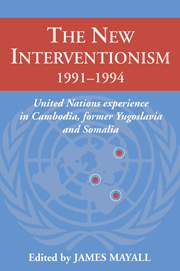 The New Interventionism, 1991–1994
The New Interventionism, 1991–1994 Book contents
- Frontmatter
- Contents
- List of maps
- List of contributor
- Acknowledgements
- 1 Introduction
- 2 Cambodia
- 3 Former Yugoslavia
- 4 Somalia
- Appendix A Cambodia
- Appendix B Former Yugoslavia
- Appendix C Somalia
- Appendix D The General Framework for Peace in Bosnia and Herzegovina
- Index
- LSE MONOGRAPHS IN INTERNATIONAL STUDIES
1 - Introduction
Published online by Cambridge University Press: 15 January 2010
- Frontmatter
- Contents
- List of maps
- List of contributor
- Acknowledgements
- 1 Introduction
- 2 Cambodia
- 3 Former Yugoslavia
- 4 Somalia
- Appendix A Cambodia
- Appendix B Former Yugoslavia
- Appendix C Somalia
- Appendix D The General Framework for Peace in Bosnia and Herzegovina
- Index
- LSE MONOGRAPHS IN INTERNATIONAL STUDIES
Summary
The nations and peoples of the United Nations are fortunate in a way that those of the League of Nations were not. We have been given a second chance to create the world of our Charter that they were denied. With the cold war ended we have drawn back from the brink of a confrontation that threatened the world, and, too often, paralysed our organisation.
Boutros Boutros|GhaliWhat are the chances that international society will be able to respond positively to the second chance identified by the United Nations Secretary-General? The scale of UN activity since the end of the Cold War might be offered as evidence that we are entering an era when international obligations will at last rank alongside the defence of national interests, even if they will not necessarily take precedence over them. Of the twenty-nine ‘peacekeeping’ operations established by the UN since 1945, sixteen have been created since 1987. At the same time, few of these operations have been unqualified successes, and the demands placed on the UN system can equally be interpreted as evidence of spreading chaos and widespread threats to stability and international order in the wake of the collapse of familiar Cold War structures. Moreover, the potential demand for UN intervention around the world is clearly greater than the Organisation's ability to respond, given the resources currently available to it, or which seem likely to be made available in the foreseeable future. Indeed, by the end of 1993 there were clear signs that the governments of the major powers were more interested in limiting than extending their international commitments.
- Type
- Chapter
- Information
- The New Interventionism, 1991–1994United Nations Experience in Cambodia, Former Yugoslavia and Somalia, pp. 1 - 24Publisher: Cambridge University PressPrint publication year: 1996
- 5
- Cited by


